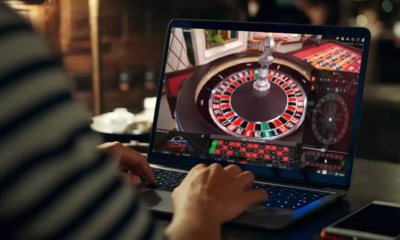Gaming
Why Competitive Games Keep Us Hooked (Even the Simple Ones)

Ever told yourself, “Okay, one last round” — and suddenly it’s an hour later, your coffee’s gone cold, and you’re still chasing that next high score? Yep, you’re not alone. And no, it’s not because you lack self-control. It’s because competitive games, even the simplest ones, know exactly how to push our psychological buttons.
The secret weapon? Competition.
Whether climbing a leaderboard, racing against a timer, or squaring off against another player, adding competitive elements turns a casual time-killer into something you genuinely care about. And honestly, how it works is fascinating.
The Psychology of Competitive Play
Humans are naturally competitive. Even people who say they “don’t care about winning” secretly love proving themselves. It’s baked into us, an instinct rooted in social comparison theory, that we constantly evaluate ourselves based on how we stack up against others.
This isn’t about being ruthless or cutthroat. It’s about self-worth, validation, and finding your place in a group. Competitive games give us an easy, low-stakes way to satisfy that urge, offering instant feedback on how we’re doing. When you add real or perceived rewards into the mix, things get interesting.
Take sports betting online, for example. It’s not just about guessing who will win a match, but also about competing against the odds, other bettors, and even your own instincts. You’re putting yourself to the test every time you place a bet. It’s about trying to predict the unpredictable.
Sports betting is even more exciting because it requires using your knowledge and strategy. You consider things like how teams have been performing, injuries, or past matchups. It’s like a mini game of its own, where your brain is constantly weighing odds, making decisions, and feeling that rush of trying to get it right.
Such is the nature of competitive play. It introduces stakes, however big or small, and triggers a similar psychological response to gaming competitions: a mix of anticipation, risk, and reward. That cocktail is hard for the brain to resist.
Why Leaderboards Hook Us
Leaderboards are deceptively simple. Just a list of names and numbers, right? But in your brain, it ranks your worth in a tiny digital world.
Here’s why it works.
Leaderboards trigger achievement motivation, our internal drive to succeed, improve, and be recognised. It feels good to see your name near the top of a list, even if it’s just a score in a mobile puzzle game. It signals to your brain, “Hey, you’re doing better than others.” That little ego boost releases dopamine, the brain’s feel-good chemical.
Plus, leaderboards constantly shift. Someone overtakes your score, you fight back. It’s an endless loop of social one-upmanship. Even if no one else cares about your ranking, you care, and that’s enough to keep you logging back in for more.
Why Time Trials Feel So Rewarding
If leaderboards are about competing against others, time trials are about competing against yourself. And weirdly, this can be even more addictive.
Ever tried to beat your own fastest lap time in a racing game? Or complete a puzzle a second quicker than before? That countdown timer amps up the tension and introduces what psychologists call flow state triggers, or conditions where you’re fully focused, immersed, and performing at your best.
And when you shave a few seconds off your previous best, your brain gets another lovely dopamine hit. Not just because you succeeded, but because you made measurable, visible progress. It’s why self-competition is such a strong motivator. It feels personal.
Plus, the immediacy of feedback in time trials, where you instantly know if you were faster or slower, creates a tight feedback loop. The faster the reward (even if it’s just a new best time), the stronger the habit-forming effect. Suddenly, what started as a casual play session becomes a mission.
Why PvP Battles Make Everything Personal
Player-versus-player (PvP) battles turn a game into a genuine test of wits, strategy, and nerve. It’s not just you against a system, but against another player. And we instinctively take it seriously.
When your performance depends on or influences someone else, it creates strong feelings. You feel proud when you win, frustrated when you lose, and eager to make up for it when you fall short.
Even casual PvP games like trivia battles, word games, or mini fighting games feel intense because there’s unpredictability involved. You can’t predict how the other person will react, and that uncertainty spikes arousal levels (in the psychological sense — increased attention, adrenaline, and emotional involvement). And because it feels personal, victories feel sweeter.
Losses sting more, and you’ll likely want to return for a rematch. That’s how simple games with PvP features quietly turn into full-blown obsessions.
Why Competition Turns Basic Games Into Must-Plays
It’s not the graphics, complexity, or storytelling that make games addictive. It’s the competitive structures layered on top. Leaderboards give you a reason to check back in. Time trials make you believe you can always do better. PvP battles let you prove yourself against others.
These elements form a habit loop built around anticipation, action, and reward. You anticipate the challenge, act (play), and receive a reward (dopamine, pride, validation). The brain loves this kind of loop, and the shorter and more consistent it is, the harder it is to break.
It’s why even the simplest mobile games you swore you’d only play for five minutes end up eating hours of your time.
Final Thoughts: It’s Not About Simplicity, It’s About Stakes
So next time you find yourself obsessed with a basic game or placing a quick sports bet, don’t be too hard on yourself. You’re not “wasting time” — you’re responding to carefully engineered competitive structures designed to press all the right psychological buttons.
It’s not about the game’s complexity. It’s about the stakes, the bragging rights, and the promise of a tiny, satisfying win. Sometimes, a small win on a leaderboard or a PvP showdown is exactly what you need to brighten a dull afternoon.
Gaming
Top Metrics NFL Bettors Should Know for Smarter Wagering

Profitable NFL betting isn’t about knowing more facts than the next person. It’s about knowing which facts actually predict outcomes versus which ones just make you feel informed. Let’s cut through the noise and focus on metrics that separate winners from donors.
1. Yards Per Play: The Efficiency Truth-Teller
Forget total yardage. A team gaining 450 yards on 90 plays got dominated by one gaining 350 yards on 60 plays. Why? Because 5.8 yards per play destroys 5.0 yards per play regardless of volume.
This metric isolates efficiency from opportunity. Teams averaging 6+ yards per play offensively while allowing under 5 defensively? They win about 80% of games. Sports analytics research from MIT’s Sloan Conference consistently shows yards per play correlating more strongly with winning than virtually any traditional volume stat. It’s the first thing sharp bettors check.
Defensively, yards per play allowed matters equally. Teams surrendering fewer than 4.8 yards per play typically win even allowing 400 total yards, because those yards came inefficiently through lots of plays, minimal progress.
2. Turnover Differential: But Watch for Regression
Everyone knows turnovers matter. The team winning the turnover battle wins roughly 75% of games. The part most bettors miss? Not all turnover advantages persist.
Some teams force turnovers through scheme and pressure and that’s skill. Others benefit from tipped passes bouncing perfect or opponents fumbling unprovoked but that’s luck and it regresses HARD. Analysis of NFL betting metrics reveals which teams sustain turnover advantages through defensive prowess versus those riding unsustainable variance destined to disappoint bettors who overvalue them. Sharp money fades teams whose records significantly exceed underlying metrics due to positive turnover luck.
When regression hits (and it always does), these teams suddenly can’t cover spreads despite looking superficially identical to their earlier selves.
3. Third Down Conversions: The Possession Controller
Want to know which teams actually sustain drives versus relying on explosive plays that dry up against good defenses? Check third down conversion rates.
Offenses converting 45%+ of third downs control games. They maintain possession, wear down defenses, limit opposing offensive opportunities. Doesn’t matter if they lack deep threats, consistent third down execution wins.
Defensively, holding opponents under 35% on third down is massive. Forces punts, creates short fields, breaks opponent rhythm. Teams excelling at both offensive third down conversion AND defensive stops? Often undervalued by public bettors fixated on sexier statistics.
4. Red Zone Performance: Points Versus Field Goals
Two teams reach the red zone four times each. Team A scores touchdowns three times and a field goal once (24 points). Team B settles for field goals all four times (12 points). Same red zone possessions, 12-point difference.
Red zone touchdown percentage separates contenders from pretenders. Teams converting 60%+ of red zone trips to TDs vastly outperform those converting under 45%. It’s the difference between championship caliber and mediocrity, often invisible in yardage stats that look similar.
The same applies defensively. Forcing field goals keeps games manageable even when opponents move the ball. Good red zone defense keeps you in games; bad red zone defense turns winnable contests into blowouts.
5. Pressure Rate Beats Sack Totals
Sacks are great, but pressure rate – how often rushers force hurried throws, quick releases, QB movement – correlates way stronger with defensive success than sack totals.
A team generating pressure on 30% of dropbacks disrupts offenses even recording just two sacks. Pressure creates mistakes: bad throws, coverage sacks, intentional grounding, fumbles. Conversely, teams allowing high pressure rates struggle regardless of QB mobility. You can’t scheme around constant pressure.
6. Time of Possession Requires Context
Time of possession sounds meaningful but context determines whether it indicates strength or weakness.
Winning time of possession while losing the game? That usually means you fell behind early and opponents abandoned the run. The stat reflects the scoreboard, not dominance.
Winning both times of possession AND the game demonstrates offensive efficiency maintaining drives plus defensive stops. That’s sustainable, predictive performance worth backing.
7. Special Teams: The Hidden Yardage
Special teams get ignored, but field position differences compound significantly. A team averaging five yards better starting position per drive essentially gets 60 free yards per game across 12 drives.
Punt and kickoff coverage, return efficiency, field goal accuracy all contribute beyond statistical visibility. Browser gaming communities tracking competitive advantages show how unblocked games and accessibility platforms understand that seemingly minor operational edges compound over time; the same principle applies in football where special teams excellence creates cumulative advantages.
8. Weather Affects Totals More Than Spreads
Heavy wind doesn’t necessarily help underdogs, but it almost certainly lowers scoring. Wind above 20mph kills passing and reduces field goal range. Rain impacts security and kicking. Snow? Forget it.
Sharp totals bettors monitor weather obsessively, identifying games where conditions suggest significant scoring deviations from posted numbers.
9. Situational Trends Matter
Teams perform differently in divisional games versus conference matchups versus cross-conference. Performance after byes varies wildly by coaching staff. Primetime separates clutch from frauds.
Track these patterns. Markets don’t fully price situational performance differences, creating exploitable edges.
Putting Metrics Together
None work in isolation. Profitable betting requires synthesizing multiple statistics, weighting appropriately based on context, and comparing your assessment against market lines.
You’re not trying to predict outcomes perfectly because this is impossible. You’re identifying games where your analysis diverges enough from public perception to create positive expected value. Do that consistently, and math handles the rest.
Gaming
The Ultimate Boredom Busters: Why Browser-Based Games at SpinBet are Gaining Popularity

Browser-based casino games have become a big part of how people gamble online today. Players are leaning toward quick access and flexibility, not downloads or complicated setup. That preference shows up most clearly with Online pokies, which are built for short sessions that slip easily into everyday moments.
Within that landscape, Spinbet has treated browser-based play as a core feature of its casino, not an afterthought. The focus stays on getting players into a game quickly, without friction, and letting the session fit around real life rather than the other way around.
For many players, browser access removes friction. Opening a tab and playing immediately feels more natural than installing additional software. From an expert evaluation standpoint, this ease of entry has made browser-based online pokies one of the most frequently used casino formats on Spinbet.
What Browser-Based Games at Spinbet Actually Mean
Spinbet operates its casino entirely through the browser using modern web technologies. There is no requirement to install any software. The same casino library is available across desktop and mobile browsers, offering consistent access to slots, live tables, and instant games.
From a product analysis perspective, browser-based play means that the full online pokies catalogue is available with the same mechanics, visuals, and features regardless of device. This approach prioritizes accessibility and consistency rather than locking users into a specific format.
Why Browser Games Work as Modern Boredom Busters
Entertainment now tends to come in short bursts. A few minutes here, a quick session there. Browser-based casino games fit neatly into that pattern.
Industry observation suggests that players often log in during small gaps in the day, on a break, during a commute, or in idle moments. Browser-based online pokies work well in those windows because they load quickly and move through gameplay just as fast.
A simple example involves someone waiting during travel. They open Spinbet in a mobile browser, play a few slot spins, and close the tab without any setup or follow-up steps. Another example is a player who checks in for brief sessions throughout the day rather than committing to a long gaming block. Browser play supports this casual usage style effectively.
Why Browser Games Keep Growing
Browser technology has advanced significantly. The gap between web-based games and dedicated software is much smaller than it used to be. Modern browsers manage sharp visuals, fluid animations, and responsive controls with little strain. What once required additional programs now runs directly in a tab.
Cloud delivery supports this shift. Games tend to load quickly, even on mid-range devices, because much of the processing happens offsite rather than on the player’s hardware. For online pokies, that means reliable performance without placing unnecessary demand on the device.
Browser play no longer feels like a secondary option. It has become the default access point for many players.
Spinbet’s Browser-First Approach
Spinbet clearly leans into a browser-first mindset. The interface adjusts cleanly across screen sizes, and navigation stays familiar whether on a phone, tablet, or desktop.
The online pokies library is structured for speed. Finding a game rarely takes effort. Categories are clearly organized, and launches do not require extra steps. The overall experience supports spontaneity rather than drawn-out processes. Play begins quickly, without unnecessary hurdles.
Top 5 Reasons Players Prefer Browser-Based Casino Games
- Instant Access
Games launch directly in the browser without downloads. - Short Session Compatibility
Online pokies offer quick gameplay loops ideal for brief visits. - Device Flexibility
Players can switch between desktop and mobile browsers easily. - Lower Commitment
Closing a tab feels simple and immediate. - Consistent Experience
The same casino features are available across browsers.
Browser-Based Play Compared to Download-Based Formats
| Feature | Browser-Based Casino Games | Download-Based Formats |
| Installation | None required | Software installation required |
| Session Length | Short and flexible | Varies |
| Device Switching | Easy | May require separate setup |
| Updates | Automatic | Manual updates |
| Accessibility | Immediate | Dependent on installation |
Gambling Advisory Notice
All casino games involve financial implications and uncertain outcomes. Players should set personal limits and approach online pokies as entertainment rather than a source of income. This article is informational and does not promote excessive or irresponsible gambling.
Where Browser Play Fits Into Spinbet’s Casino Strategy
Spinbet’s focus on browser-based games follows a simple principle: players value convenience. Allowing access to full-featured online pokies without downloads aligns naturally with how digital entertainment is consumed today, quick, flexible, and on demand.
Even without referring to a specific format, the broader takeaway remains consistent across the industry. Browser-based casino play has become standard. Spinbet offers a clear example of how that approach can function smoothly within a modern online casino environment.
Conclusion
Browser-based casino games have shifted from being a secondary option to becoming central to online gambling behavior. Their ability to deliver fast, flexible entertainment explains why they continue to gain popularity as boredom busters.
Spinbet’s browser-first approach to online pokies illustrates how accessibility, usability, and streamlined design can shape player engagement without relying on additional software or extended sessions.
Gaming
Best High RTP Slots [2026 Guide]

Looking for high RTP slots? Luckily, there are still plenty of them around, despite many operators reducing RTP percentages over the past several years following a rise in players. So, whether you play in a regular online casino or a sweepstakes casino with free to play sweeps casino games, these are the best high-paying slots on the table.
The Best High RTP Slots for 2026
Classic slots, Megaways slots, and others have what’s called a Return to Player (RTP) percentage. It represents how much a slot pays back to the player on average and is calculated over millions of spins. As a quick example, if you were to play a 97% RTP slot, you could expect $97 returned for every $100 you wager.
What all of this means is that the higher the RTP is, the better. Typically, you want to choose slots with an RTP of at least 95%, with anything above 96% being considered good in the current slot age. And to help get you started, we’ve put together some top picks that all have RTPs of 96% or higher.
- Mega Joker • Up to 99% RTP • Released 2008
The RTP of Mega Joker ranges from 76.9% to an industry-groundbreaking 99%, but it all depends on how players use the Supermeter mode. This is the standout feature of Mega Joker that allows you to transfer your winnings over to Supermeter mode to experience the maximum RTP and much larger payouts. This slot also lets you enjoy classic fruit symbols, Mystery Wins, Progressive Jackpots, and a nostalgic 3-reel x 5-line slot grid that brings back memories of the good ol’ slot days.
- Ugga Bugga • 99% RTP • Released 2006
Ugga Bugga comes with 3 reels, 10 paylines, a max win of 1,000x your stake, and – to top it off — a huge RTP of up to 99%. Here, Playtech transports you deep into the jungle where you spin the reels and try to land as many winning combos of Tribe-themed symbols. The game itself is a little dated in that the graphics are old and there are literally zero bonus features, which is extremely rare for an online slot these days. Instead, the best players can hope for is to land the Totem Wild symbol, which substitutes for all other missing symbols when needed. If you want the highest RTP possible and nothing else, Ugga Bugga is the go-to slot, but if you need Bonus features and more, it comes up a little short.
- Book of 99 • 99% RTP • Released 2021
You won’t be surprised to discover that the Book of 99 slot has an RTP of 99%. Released by Relax Gaming, this is a major favorite among slot players and brings an ultra-exciting Greek God theme where you battle among legends. There are plenty of Free Spins (triggered by landing 3 or more Wilds) up for grabs here, as well as the huge potential to win up to 5,000x one’s bet. Plus, there’s also the ‘Collection Meter’ on the side of the slot reels, which builds up every time you collect 1 Wild. Once you’ve collected 99 of them, even more Free Spins will be given to you.
- Blood Suckers • 98% RTP • Released 2009
Ready for another old-school classic? Play the Blood Suckers slot today and enjoy an RTP of 98% and plenty of spooky wins and bonus features inside the haunted castle. If you’re noticing a trend here, it’s that many of the high RTP slots we know and love were released close to two decades ago, with 2009’s Blood Suckers from NetEnt being one of them. If you can handle the fang-tastic symbols, like the blood-red Eyeballs and terrifying Vampires, there are plenty of Wilds and Scatters to look forward to. Not to mention, Blood Suckers also has a superb Vampire Slaying Bonus Game, triggered by 3 or more Bonus symbols. This mode transports you to a dark room filled with coffins and (if you’re brave enough) you get to click and open one. If a Vampire is revealed in one of the coffins, some Bonus Coins will be heading your way.
- Fat Rabbit • 96.45% RTP • Released 2018
Released in 2018 by Push Gaming, Fat Rabbit slot is another excellent high RTP slot that currently clocks in at 96.45%. It might not be as high as the others, but it’s still a great 5×5, 50-payline slot with plenty of juicy carrots for players to land. Without a doubt, the Harvest feature is the best in-game moment, as all you have to do is wait for the Harvest to drive past where it randomly unearths several Wild Carrot symbols from underneath the reels. And if you’re lucky enough to land Rabbit and Carrot symbols while playing this game, it’ll unlock some Free Spins for you.
Where to Play High RTP Slots
If you’re looking to play Mega Joker, Book of 99, or any of the other high RTP slots currently available for players, you can do this in:
- Online casinos
- Sweepstakes casinos
The difference here is that online casinos require you to bet real money when you play these slots, while sweepstakes casinos, also known as social casinos, let you play for free with virtual Gold Coins or prize-winning Sweeps Coins.
🎰🎁 Let’s say you play the Mega Joker slot in BetMGM Casino. You’d need to bet actual dollars, such as $10 or $20. But if you played Mega Joker in a sweepstakes casino, the option would be there for you to play with Gold Coins (just for fun) or bet Sweeps Coins and potentially redeem some prizes after.
But no matter where you play, these slots all come with high RTPs so you’re statistically more likely to get a return on your bets than if you were to play slots with an RTP of 95% or lower. From a player perspective, it’s a no-brainer.
Summary
Online slots are more popular than they’ve ever been.
Players all over the US, Canada, and other parts of the world are putting in plenty of hours spinning the slot reels or watching other people do it on Kick and Twitch.
If you’re also planning to get into the world of slots, it’s highly recommended that you start with our high RTP top picks in order to give yourself the best possible chance of winning.
The higher the RTP, the better.
And even though RTPs aren’t as high as they used to be and have actually been reduced in many cases, there’s still a decent selection of high RTP slots out there for players to enjoy.
-

 Finance3 years ago
Finance3 years agoProfitable Intraday Trading Advice For Novices
-

 Gaming2 years ago
Gaming2 years agoPixel Speedrun Unblocked Games 66
-

 Gaming3 years ago
Gaming3 years agoSubway Surfers Unblocked | Subway Surfers Unblocked 66
-

 Internet3 years ago
Internet3 years agoWelcome to banghechoigame.vn – Your One-Stop Destination for Online Gaming Fun!
-

 Gaming3 years ago
Gaming3 years agoMinecraft Unblocked Games 66 | Unblocked Games Minecraft
-

 Gaming3 years ago
Gaming3 years agoGoogle Baseball Unblocked | Google Doodle Baseball Unblocked 66
-

 Internet3 years ago
Internet3 years agoPremium Games Unblocked: Unleash Your Gaming Potential
-

 Gaming3 years ago
Gaming3 years agoTunnel Rush Unblocked | Tunnel Rush Unblocked 66



























